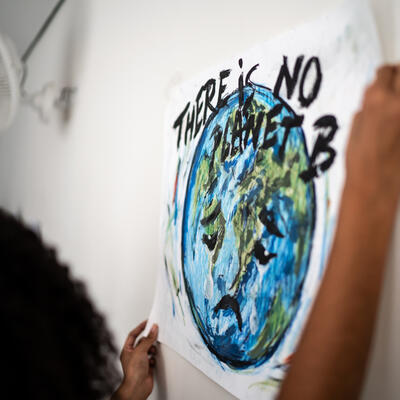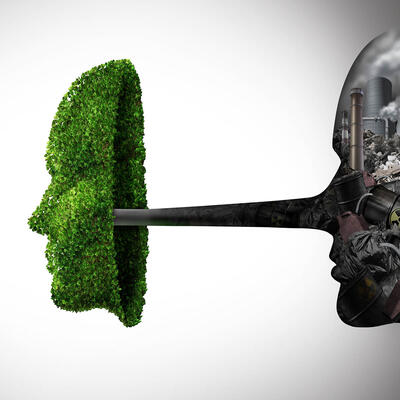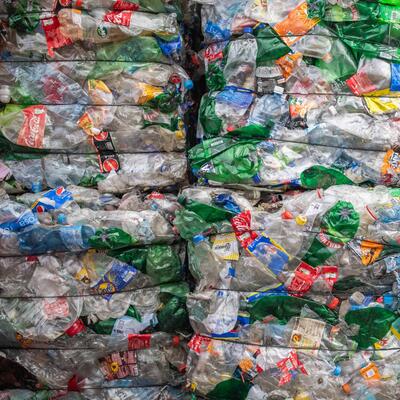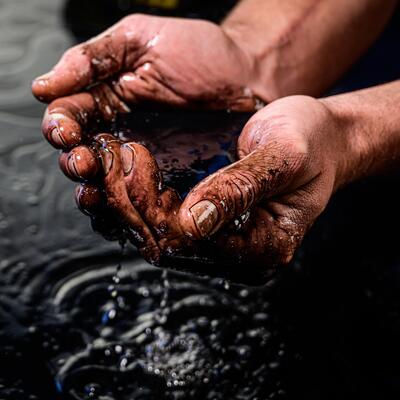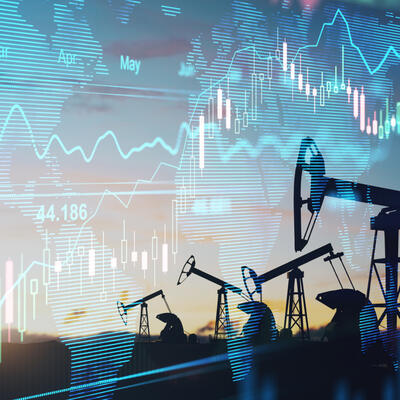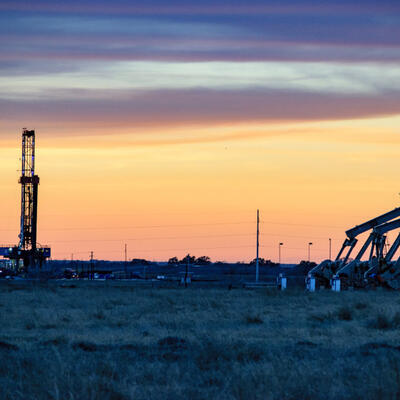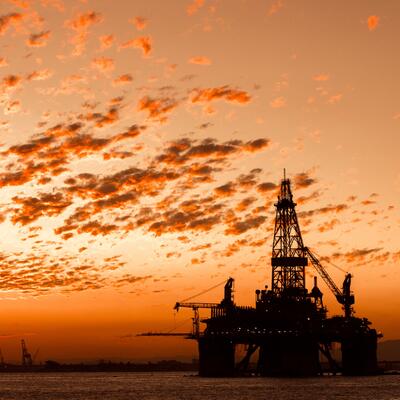
Amy Westervelt on Drilling, Denial and Disinformation
Guests
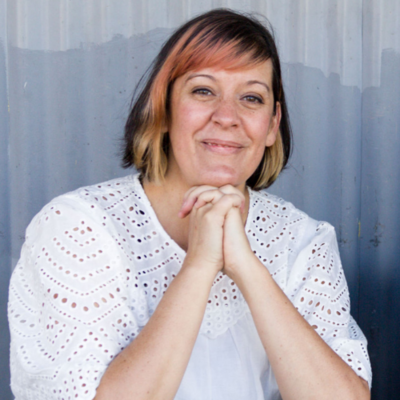
Amy Westervelt
Summary
Investigative journalist Amy Westervelt covers big oil’s methods of shaping public opinion and legal rulings in its favor – which they’ve been doing for decades. That includes sustained PR campaigns convincing the public that oil and gas were essential to our way of life, and battling mainstream news organizations to include the industry’s perspectives, creating the idea of false equivalence.
These efforts and more laid the early groundwork for the First Amendment corporate free speech argument that oil companies are using today to defend their actions when it comes to climate denial. How these cases are resolved could set a dangerous precedent for democracy, Westervelt says.
“What does that open the door for companies to be able to do, if lying in the interest of shaping politics is okay?”
Westervelt recognizes that companies are not monoliths; people working in technical or mechanical jobs in the field aren’t crafting disinformation or obstructing climate policy in legislatures.
“There are lots of oil workers, engineers, managers, all kinds of folks who have skills that are needed in an energy transition in lots of other kinds of industries and who are not calling the shots.”
Despite overwhelming scientific evidence on the climate-harming impacts of burning fossil fuels, Westervelt says there’s been almost no accountability for the climate crimes of oil industry executives.
“The idea that climate denial was a thing that happened in the past, had this past impact, or that these companies are any different now than they were in the 80s is not really backed by any evidence,” she says. “They still have an enormous amount of power not just with the U.S. government but governments all over the world.”
The second season of Drilled is about crab fishermen who brought the first major oil lawsuit after they realized climate disruption would threaten their livelihood. One of the key reasons they sued wasn't because they believed that humans burning fossil fuels causes global warming, but because they felt betrayed by oil companies who were taking out patents to reengineer offshore oil platforms to deal with sea level rise while telling fishermen not to worry about it. That feeling of betrayal was what triggered the lawsuit, more than any belief in climate science.
Westervelt says understanding that viewpoint really changed the way she thought about climate, and the power of basic fairness and equal access to information — as opposed to the power of scientific data — to motivate action.
“Because a lot of climate people will kind of rally around this like, ‘believe science’ idea. And I think if you look at science literacy rates in the U.S., if you're gonna hang your hat on believing science, I think you’re gonna be waiting a long time.”
Resources From This Episode (3)
Full Transcript
Note: Transcripts are generated using a combination of automated software and human transcribers and may contain errors. Please check the actual audio before quoting it.
Amy Westervelt on Drilling, Denial and Disinformation
Greg Dalton: This is Climate One, I’m Greg Dalton.
Ariana Brocious: And I’m Ariana Brocious.
Greg Dalton: Today we’re featuring an interview with Amy Westervelt, a podcasting peer of ours.
Ariana Brocious: Amy’s an award-winning investigative journalist and executive producer of Critical Frequency, an independent podcast company. She’s produced the series Drilled, Damages, and Hot Take, among other projects. Her work covers big oil’s methods of shaping public opinion and legal rulings in its favor – which they’ve been doing for decades.
Amy Westervelt: The idea that climate denial was a thing that happened in the past, had this past impact… that these companies are any different now than they were in the 80s is not really backed by any evidence.
Greg Dalton: I first started listening to Amy’s work when Drilled and Climate One were both nominated for an iHeartRadio podcast award in 2019. I went to Hollywood for the red carpet event hosted by Will Farrell. It was very glam. And Drilled won our category.
Ariana Brocious: Amy’s work casts oil companies as climate villains, which they certainly are in their production and distribution of climate-disrupting fuels. Still, she recognizes that companies are not monoliths - people working in technical jobs in the field aren’t crafting disinformation or obstructing climate policy in legislatures. That’s done by a relatively few people at the top, and for them, there’s been almost no accountability for their climate crimes.
Greg Dalton: True. And I think that distinction is important, to focus on the executives at the top leading disinformation policy campaigns and not the rank and file workers who are not the villains in this story. Those executives at the top claim their policy and PR campaigns are protected corporate speech. Amy says that’s dangerous for our democracy:
Amy Westervelt: What does that open the door for companies to be able to do if lying in the interest of shaping politics is okay?
Ariana Brocious: And one thing I learned from Amy in this episode is the ties Justice Amy Coney Barrett has with Shell Oil, her father’s employer for decades. As a lower court judge she recused herself from a Shell case in an apparent attempt to avoid a conflict of interest.
Greg Dalton: But Justice Barrett didn’t recuse herself when a major case about oil companies came before the Supreme Court. We’ll hear a bit about that category of suits, known as nuisance cases, in this episode.
Ariana Brocious: We taped this conversation in front of a live audience at the Commonwealth Club of California.
Greg Dalton: And I started by asking her about something she covers in her first episode of Drilled that will probably surprise you. Decades ago, Exxon was funding remarkable research into non-fossil forms of energy, including nuclear, batteries and even solar. It was striving to mimic Bell Labs, the famed research facility named after Alexander Graham Bell, inventor of the telephone. Exxon was ambitious.
Amy Westervelt: This was an initiative that Exxon started in the 70s. It was their Exxon research and engineering facility. And I spoke with several former Exxon scientists who all describe it the same way, which was that Exxon wanted it to be the Bell Labs of energy.
Greg Dalton: And for people who don't remember the Bell Labs. Say how big a deal Bell Labs was.
Amy Westervelt: Bell Labs like invented the cell phone, amongst many other comms technologies...
Greg Dalton: Transistors.
Amy Westervelt: Yes. Satellites, cellphones, transistors. So, they wanted to do that for energy. And this is, you know, just to sort of set the historical context this is happening in the 70s. We had oil embargo against the US. Jimmy Carter is pushing for investments of different types of energy and the oil companies want to be part of this.
Greg Dalton: Right. So, they want to be not just oil companies but energy companies. Get into solar and all sorts of different things. And then there are some leadership changes, and they basically pivot away from that idea.
Amy Westervelt: Right. There are leadership changes and also market changes. You know you go from oil really skyrocketing the price per barrel of oil to it dropping and they’re being sort of a glut in the 80s. And also, you have Lee Raymond taking over Exxon who was very much like we’re an oil company we've always been an oil company that's what we do this other stuff is nonsense. So, I just want to like give proper credit to the journalists Inside Climate News and Columbia Journalism School, the LA Times for really like breaking that story open in 2015.They published all kinds of internal documents from Exxon. That's what allowed me to figure out like who is still alive with the documents and go talk to them.
Greg Dalton: I think they got a Pulitzer Prize for that.
Amy Westervelt: They did, yeah, well-deserved.
Greg Dalton: And as you cover in detail in your podcast oil companies began to pivot away around the time of this pivot they also launched PR campaigns. Convincing the public that oil and gas was essential to our way of life. Let’s hear from Brown University's Dr. Bob Brulle on this.
Bob Brule: Literally since after World War II the fossil fuel companies have actively engaged in public relations campaigns to sell the automobile and fossil fuels as the American way of life. And as the good life, and the idea is that fossil fuels become part and parcel of progress, the good life, economic gain and jobs. And I have an unpublished report from Mobil that talks about how they seeded the collective unconsciousness with these ideas.
Greg Dalton: I don’t often think of oil companies talking about collective unconscious.
Amy Westervelt: Oh yeah, the fossil fuel industry was one of the first clients of the PR industry way back like you know many, many decades before climate change was a thing before World War II. They were one of the earliest users of market research. They pilot tested, you know, Elmo Roper’s surveys in the 19 teens I want to say and early 20s to really figure out in a very granular way the way that people thought how people are making decisions on both, you know, what they were buying but also what they were voting for. And what they can do to sort of shape people's ideas about not just you know what brand of gas they were filling up with, but you know how they thought about the environment and energy. And how they thought about the economy and what was important and how they thought about American identity. All of that stuff. And then it really ramped up post-World War II. I actually found the document from an early publicist of Standard Oil of New Jersey, which is now Exxon Mobil. This very detailed strategy where he was pulling together all of these clients so this at the time was like GM, Ford, Campbell Soup, Procter & Gamble, Eli Lilly, Standard Oil New Jersey. All of these big American companies and saying like you know all hands-on deck. We need to remind Americans that free-market capitalism is the thing that makes them American. And like all of your industries are really gonna suffer if we allow people to continue to think that the government should be involved in regulating business as much as they have been during the war. So, those are the kinds of things the industry has been doing for more than 100 years before we even get to the climate change issue. They're laying that kind of foundation.
Greg Dalton: Right. Naomi Oreskes has done a lot of work here about sort of market fundamentalism and her new book kind of The Big Myth kind of like it’s really this free market ideology that is applied to all these areas. And you talk about these PR people as the mad men of big oil as you call them, originated so many tactics against climate action that we’re familiar with today. Denial, delay, a lot of the “D” words as well as false equivalency, astroturfing and more. A notable member of this group was a man named Herb Schmertz, Mobil Oil's longtime PR person. And I listened to your work I keep coming back to Herb Schmertz.
Amy Westervelt: As do I, I’m obsessed with him. Yeah.
Greg Dalton: Let’s hear a bit of Herb Schmertz and then talk about his impact.
Herb Schmertz: Well, it seems to me that the term spin doctor is something the press has manufactured to really deal with the problem the press has. The press by and large would like to control the agenda and the terms of reference of all debates, and they'd like to decide what information they're going to deliver, what information they're not going to deliver.
Greg Dalton: So, how powerful was Schmertz’s campaign against mainstream news organizations?
Amy Westervelt: Oh man, I mean this is one of the things where I feel like when you’re talking about PR a lot of times people think okay, they’re, you know, pitching stories they’re getting their executives interviewed. Maybe they're advising on an advertising strategy. No. What these guys mean by it is literally public relations not means the relationship that the company and the industry has with various public. So, moms,single women, young people working men nonworking men, you know, like every demographic they have a different relationship that they're navigating, including with policymakers, influencers and press people. And one of the ways to shape all of those relationships is to fundamentally change the structure of how the media works. And Herb Schmertz I think more than anyone really did that. Like he came in and he said you know, forget this whole thing where you're trying to be friends with the journalists. Like you need to bully them; you need to call up their boss and threaten to get them fired if they're not covering your company correctly. You need to accuse them of bias, which was really effective. I credit him a lot with the emergence of false equivalence in the 80s and 90s in a big way. Because he would accuse any journalists that didn't basically like let Mobil have half of an article to share their viewpoint being biased against the industry against business people in general. He went on this whole crusade with Hollywood because he was mad that the bad guys in every TV show are always businessmen. So, he would go and meet with all these studios and be like you need to stop vilifying corporate businessmen. He like famously had this big spat with the Wall Street Journal. This is obviously a very different Wall Street Journal than exists today back in, you know, in the 80s and 90s. And he was mad about how they were covering the oil and gas industry in general and Mobil in particular, he demanded a meeting. At this meeting, you know, he had like a bullet point list where he was gonna walk them through all the ways that they were missing Mobil's valuable insights into things. And he got as far as the first bullet point and the executive editor at the time just jumped up and said everything you're saying is bulls***, and left the room. And Herb Schmertz was like, that’s it, he canceled all their ad buys with the Wall Street Journal. He refused to let Wall Street Journal journalists have access to like earnings numbers reports. Wouldn’t let them talk to anyone at the company. He’s like, that’s it, we’re not gonna even speak to you anymore. And at first, you know, the journal kind of stood their ground but, you know, you look five or so years down the road and Mobil's ads are back in play; coverage has softened against the industry considerably. There are a lot more oil and gas executives being interviewed in stories about environmental policy and the impact that it has on the industry and all those kinds of things. So,you know, his tactic worked. He's also the guy who created the advertorial with the New York Times. So, this again is something that Naomi Oreskes and Geoffrey Supran have covered extensively. But Mobil and then ExxonMobil had weekly opinion pieces in the New York Times op-ed section that were ads, but they looked like editorials and --
Greg Dalton: Highly effective. They were there for like decades it seems like. They were there for a long time.
Amy Westervelt: I think it’s close to 30 years.
Greg Dalton: And his work laid the early groundwork for the First Amendment corporate free speech argument that oil companies are using today to defend their actions when it comes to climate denial. Tell us about that and its importance.
Amy Westervelt: Yeah. So, he helped create the advertorial, right, in print. It was very successful for them. He really came up with this whole idea of like look, instead of selling gas we should be selling ideas. We need to develop a personality for Mobil and, you know, get people to think of us a particular kind of way. He wanted them to be the thinking man's oil company. So, you know, he had the advertorials. He was sponsoring content on PBS. They launched Masterpiece Theatre. This is all happening in the late 70s. And then he has the idea of taking the advertorials to TV. So, they make all of these video advertorials and they take them out to the big three TV stations at the time, which are NBC, ABC and CBS. And CBS and ABC said no, these are propaganda and we’re not gonna run them; we’re pretty sure it would be an ethics violation for us and maybe even illegal, no way. And Herb Schmertz and Raleigh Warner who is the CEO of Mobil at the time really saw this as a big potential problem for them. They were like, what if the New York Times starts reconsidering this too because of this. What if PBS starts to think only be, you know, we’re running afoul of ethics here. So, they made a big full-court press. They went to all of the little like economics clubs in different cities. They went to the US Chamber. They were on radio and TV everywhere, making the argument that it was very important to American democracy to protect corporate free speech. And this is like the first time you start to see this being made as a legal argument. They also helped to gather support for a big case that predates Citizens United called Bellotti, which was really like the first kind of shoe to drop in the whole corporate free-speech arena. And today, ExxonMobil and Chevron and Shell and all these other companies are saying, look, anything we've ever said about climate was in service of shaping policy in a particular way that makes it --
Greg Dalton: Public speech not commercial speech.
Amy Westervelt: That's right. They call it petitioning speech or political speech which means that it's protected. And now it’s like, yeah, it’s the argument that they’re making in, you know, multiple climate liability and fraud cases against them.
Greg Dalton: Schmertz really is the godfather. Oil companies had other tools too like weaponizing uncertainty which you call scientist’s kryptonite. I love that frame. And they attacked and intimidated climate scientists and journalists. In your latest season of Drilled we hear from Steve Coll an investigative journalist for the New Yorker magazine who authored an excellent book called “Private Empire: ExxonMobil and American Power.” He had this to say about the company.
Steve Coll: I thought it was hard to report on the CIA. I came to understand that Exxon was far more difficult and a little bit scarier, even. I joked with my colleagues that if I disappeared, like if some van pulled up beside me on the street and I was bundled away and they never saw me again, that it wouldn’t be Al Qaeda, which I had reported on, it wouldn’t be the CIA, which I reported on, it would be Exxon. They have that way of creeping people–of intimidation, actually. And it’s a strategy and they’re very practiced at it and effective at it. They have a lot of power and resources with which to intimidate people.
Greg Dalton: Hearing that just creeps me out.
Amy Westervelt: I know, yeah, he put it very succinctly and boldly. But, yeah, I mean I think anyone who's done an excellent story has a story like that.
Greg Dalton: Well, you have stories, in the pod you mentioned this when your hotel reservation was canceled. So, what intimidation have you personally experienced because of going after these companies this way?
Amy Westervelt: Yeah. I have to say, for legal reasons I can neither prove nor disprove that Exxon was directly involved with any of these things. But every time we’ve done an Exxon story if there's travel involved all my travel plans get canceled.
Greg Dalton: Exxon calls Marriott and says --
Amy Westervelt: Someone, I don’t know, someone calls someone. And–
Greg Dalton: Your hotel room disappears.
Amy Westervelt: Or I show up at the airport and my ticket has been canceled or I go to get my rental car and that reservation has been canceled or you know it's just sort of like --
Greg Dalton: So, harassment kind of.
Amy Westervelt: Yeah, it’s just kind of like, okay, you know, this is happening. When I was in Guyana reporting our most recent season, my hotel room got broken into and my laptop was open with like various files on it, but nothing was stolen from my hotel room. So again, you know, I don’t know who it was but someone who is not interested in the cash on my nightstand or taking my laptop with them. And, you know, I don't leave anything that's sensitive on my laptop so it's not like I was like oh no they have information I don't want them to have. It's just sort of like okay you know.
Greg Dalton: But no, I mean we live in an era where journalists have physical threats and worst. So, nothing of that nature.
Amy Westervelt: No, no.
Greg Dalton: Good.
Amy Westervelt: Yeah, I’m lucky in that regard.
Greg Dalton: Coming up, the unexpected ties between a legal case involving the adoption of Native American children and the oil industry’s interests:
Amy Westervelt: If they can prove in these Indian Child Welfare cases that that law is race-based, then that's potentially a domino to unravel the entire foundation of tribal sovereignty in the United States.
Greg Dalton: That’s up next, when Climate One continues.
Greg Dalton: We’re talking with Amy Westervelt about drilling, disinformation and denial.
Ariana Brocious: As we talked about before the break, Mobile Oil PR guy Herb Schmertz and others were highly effective in buying time for the industry and delaying action on the necessary move away from fossil fuels to cleaner energy. Eventually the public caught on and cities and counties took oil companies to court using a legal doctrine known as nuisance cases.
Greg Dalton: That's where RAGA, the Republican Attorneys General Association comes in. Let’s hear a little from Lisa Graves, Executive Director of True North Research, a watchdog group focused on corporate distortion of American democracy.
Lisa Graves: Something has happened over the last 20 years in terms of the rise of the RAGA, the Republican Attorneys General Association, where we know that it is a pay to play operation. We know that it has had an enormously distorting effect on US law. It provides a mechanism for corporations to pass money through to help attorneys general in ways that they would not be able to individually solicit for their own campaigns given their regulatory role over those very industries.
Greg Dalton: Amy Westervelt says she’s learned a lot from Lisa Graves about money flowing to climate obstruction.
Amy Westervelt: She's done an enormous amount of research. I think the main reason anyone knows about the role that, for example, the Federalist Society has played in installing certain judges both on the Supreme Court and on lower courts is due to Lisa’s research originally. She was one of the early people to start kind of unfurling the web of things around the Koch brothers and everything that they were funding. When it comes to RAGA in particular, she has been really instrumental in kind of lifting up the role of that organization in US politics. And they have an incredible amount of power. That organization started as a direct response to the tobacco litigation in the 90s. It was like, hey, that was an effective strategy maybe we should be doing it on our side. But also, we've been neglecting attorneys general as, you know, political appointees. And so, initially in its first decade, RAGA was really focused on just getting more Republican attorneys general in power because there were way more Democratic attorneys general. In the most recent decade it's been bringing these big structural cases. So, what will happen is you know you got like Ken Paxton in Texas or the Atty. Gen. of West Virginia, who you know brought this case, West Virginia versus EPA. And they will kind of file the case but, you know, a dozen or more Republican attorneys general will sign on to it as well, which is often a good way to get cases to the Supreme Court. And they will make a big kind of structural argument. So, like in the case of West Virginia versus EPA. The government shouldn't be involved in regulating emissions. They like to bring in things like the major questions doctrine which is a big thing in West Virginia versus EPA where, you know, these kinds of very vague, very nebulous things that they can use to kind of expand the power of any one ruling. So, in that case, for example, it says that any time a policy brings forth or answers major questions that really should be being answered by the government itself by Congress that you know that's not something that an agency should be doing. So,those are the kinds of things that RAGA does; it's not just in the environment and climate space. They've been very active in, for example, pushing against abortion rights. Pushing against transgender rights. This is something I think that people maybe miss in the climate movement a lot – that when you're talking about an organization like RAGA or groups like Cato Institute, Heartland Institute, the Texas Public Policy Foundation. These are not single-issue entities. They combine all of like the laundry list of items in one place. And they spend the same amount of money and put the same operatives on all of them. And it's a very effective strategy.
Greg Dalton: And one that I was really shocked to learn in This Land, another podcast you’re involved with, is the connection with the Indian Child Welfare Act, which is another kind of like working at a deeper level, right?
Amy Westervelt: Trojan horse. Yeah.
Greg Dalton: So, explain what that’s about and how is that connected, the adoption of indigenous children, how is that connected to fossil fuels?
Amy Westervelt: Yeah, it's a pretty dark story. So, in 2013 you saw the first really big constitutional challenge to the Indian Child Welfare Act since its passage in 1978. It was passed unanimously by Congress in 1978. It was meant to deal with the fact that indigenous kids were 30% more likely to be removed from their homes.They were often being put into homes that totally disconnected them from not just their family but also their tribe and their culture. And so, the idea was to just put some guardrails in place to you know kind of force child protective services to ask some specific questions when they removed Indian children from their homes. Went largely uncontested for decades and then all of a sudden you see this big high-profile case going to the Supreme Court. It gets shorthanded as Baby Girl because you know it's an anonymous child that's involved in the case. In that case, you start to hear for the first time this argument that ICWA, the Indian Child Welfare Act, is race-based and therefore unconstitutional. This is a really big deal because it's not just talking about the Indian Child Welfare Act it’s talking about the whole basis for what everyone calls Indian Law. So, the same laws that let tribes have their own healthcare service that give tribes land and water rights for example, which is where you start to see fossil fuel companies getting interested, gaming rights, all of that stuff. It's all based on the legal understanding that Indian is a political not racial classification. That, you know, you are a citizen of a particular tribe and that that has nothing to do with ethnicity or race. And that these particular rights are imbued by treaties between two sovereign nations not given by the government to a particular group of people because of their ethnic background. So, if they can prove in these Indian Child Welfare cases that that law is race-based, then that's potentially a domino to unravel the entire foundation of tribal sovereignty in the United States. The reason I started looking at it, was that a reporter that had been looking at for a long time, Rebecca Nagle, came to me and was like this new law firm is involved in these cases. Like I've been following these for a while now all of a sudden, they have this big shot corporate law firm that's taking all these cases pro bono. And I was like, oh, what law firm is it? And she goes Gibson Dunn. And I was like, well, I mean Gibson Dunn is a big oil and gas firm. They are Chevron's attorney, they represent lots of other companies in the oil and gas space. They also happen to have a lot of gaming clients as well, which is the other industry that stands to benefit from what may happen in these cases. So, we started looking into it. We figured out that was being funded by initially by the Bradley Foundation, and, you know, kind of pieced it all together from there. But, you know, those are the kinds of things that can happen where you have people that are looking for clever legal strategies and, in this case, a really cynically very clever cover story. Because you know child welfare cases are complicated there's a lot of like family drama that's at the surface level. It's very easy to get people distracted by what's happening in this particular case and not what the actual overarching goal is.
Greg Dalton: Right. And yeah, so suddenly this big law firm suddenly takes an interest in indigenous children; there’s a very sympathetic plaintiff in that case. This couple wants to adopt a baby, we’re doing a good thing adopting this indigenous child and giving them a nice home. I also noticed that Caitlin Halligan, a Gibson Dunn attorney who worked for Chevron against Stephen Donziger, the lawyer who led the case against Chevron's massive oil pollution in Ecuador, covered in season two of Drilled. Caitlin Halligan was just appointed to New York's highest court. What's the impact of that Chevron's lawyer now is on the highest court of New York which has been out front on moving away from carbon fuels?
Amy Westervelt: Yeah, I mean I think it potentially has a big impact. Anytime you have an industry friendly judge in a district like that where that sees a lot of cases around this issue, you know, raises questions about how biased or not that person is going to be and what kind of --
Greg Dalton: Wouldn't she have to recuse herself from Chevron cases?
Amy Westervelt: You would think but, you know, you think that Amy Coney Barrett would recuse herself from Shell cases and she's not. Alito kind of flips back and forth given his ConocoPhillips ties.
Greg Dalton: We’ll see how that one plays out. Each season of Drilled has a different focus. And the current season entitled Light Sweet Crude is focused on new oil colonialism in Guyana. For those Americans who can't find it on a map, it’s a South American country. A key character is Melinda Janki, a former attorney for BP who helped write Guyana's environmental law that was before big oil came to town.
Melinda Janki: My heart just sank because I know oil is a disaster and it's the worst possible thing that could have happened to Guyana. And people just began to go crazy at the idea of all this oil wealth. And sure enough, the first thing that we saw was that they entered into a new agreement, which was secret. They wouldn't release it to people when they finally released it. It was atrocious.
Greg Dalton: So, who is Melinda Janki and what is she trying to do?
Amy Westervelt: She's a really interesting person. So yes, she did work for BP for a few years in the UK before going home to Guyana where she continued to work in corporate law, but started to get interested in environmental law. She helped to write the first kind of major environmental protection act in Guyana which launched their environmental protection agency. She also helped to draft a right to a healthy environment in Guyana's Constitution. And part of why she did that was that she had seen the country go through several kind of phases of what development economists call the resource curse. Which is, you know, when a country that is less developed, you know, discovers a valuable resource and then you know lots of other entities kind of swoop in and the economy starts to become totally dependent on that element and mostly leaves. Yeah, they often end up worse off than they were before they develop that resource. So, I mean Guyana has been through gold, bauxite, diamonds, timber. It just an incredible number of waves of this and every single time it kind of goes the same way. So, Melinda thought well maybe we can put some laws in place that would make it harder for that to happen. And then she kind of watched as you know, Exxon announced in 2015 that they discovered large amounts of oil offshore. And here we go again and now this time there are laws in place but the government is just choosing not to enforce those laws. So, she has now filed seven lawsuits in the last three or four years, all against the government. She's not suing Exxon she's suing her own government. She's from Guyana, she’s suing her own government for not enforcing the laws that she also helps to write. So, it’s funny like in one of the cases I think initially in most of these cases, Exxon is either requested to be added or the judge has added them. And in one of them, Exxon, kind of tried to argue that she was misinterpreting the law and she was like it's interesting argument because I wrote it so I’m pretty sure I know what it means.
Greg Dalton: And what impact has Russia's war on Ukraine had on the oil market and in Guyana?
Amy Westervelt: Oh man, a huge, huge impact. So, you know, you saw the American Petroleum Institute started mobilizing its messaging around Russia and Ukraine before the official invasion happened. So, as soon as you know, troops start to appear along the Ukraine border you see API president Mike Sommers making the rounds all the cable news shows saying you know gas prices are about to go up because there’s this like unsettling thing happening and because Biden's climate policies are making oil and gas more expensive. At the time this is like pre-IRA pre-a lot of things there was really no climate policy to speak of. But they were kind of seeding that talking point. Then you have the invasion in February. Within a few days the API has presented its kind of laundry list of requests to the government including fast tracking permits for liquid natural gas export terminals, pipelines, all that kind of stuff. Within a couple weeks the DOE is starting to fast-track those permits, a bunch of terminals that had been kind of stalled out get going again. And then --
Greg Dalton: So, they’re really seizing on this moment to fast track the stuff to bring prices down, which is a receptive audience among any politician.
Amy Westervelt: Right. They’re saying, oh like, if we can just get this stuff going then it will stop gas prices from going higher. And also, they want to take advantage of the fact that Europe is going to need gas from somewhere that's not Russia and they want it to be Americans. So, by you know, exactly a month from the invasion date, Biden makes this announcement that he has inked this partnership with the European Union to lock in gas orders for at least the next decade. On the back of that, you see many American companies pushing for a really long term contracts in Europe, to the point where actually European officials are like, you know, we don't like trying to find ways to make it illegal to sign these things because they're worried now that they're going to be locked into 20, 30-year contracts with American companies that will make it impossible for them to meet their Paris commitments.
Greg Dalton: Right. Right.
Amy Westervelt: So, they're getting in a little bit of a legal bind themselves there because you know European governments that are doing things that are setting them off track to meet their Paris climate agreements are being sued for that. So, they're like, you know, kind of in this position. Meanwhile, Russian imports into Europe have increased 46% from pre-to post-invasion. So, the idea that there's a huge immediate shortfall of gas that needs to be filled by more US drilling is ridiculous on a few points. First, you know, it takes like a good few years to get an export terminal bill and operational. You don't just like you know turn on a switch one day to the next. Two, no one has really stopped taking Russian gas.
Greg Dalton: People are buying it through what, secondary ships, it's kind of undeclared market of Russian hydrocarbons.
Amy Westervelt: Exactly. And not even that hidden. I mean Total is just straight up importing into France from Russia. So, it’s not, you know, it's not being hidden that well anyway. The industry did a great job of leveraging that invasion to lock in gas for the next 20 years.
Greg Dalton: You're listening to a conversation with podcaster and investigative journalist Amy Westervelt. This is Climate One. Coming up, oil company climate deception and opportunism is not a thing of the past:
Amy Westervelt: Their marketing’s different, that’s for sure. Their websites have changed. But they’re still leveraging a war to sell more gas.
Greg Dalton: That’s up next, when Climate One continues.
Greg Dalton: This is Climate One. I’m Greg Dalton. We’re talking with Amy Westervelt, investigative journalist behind the podcasts Drilled, Damages and Hot Take. The second season of Drilled is about crab fishermen who brought the first major oil lawsuit after they realized climate disruption would threaten their livelihood. One of the key reasons they sued wasn't because they believe that humans burning fossil fuels causes global warming. They sued because they felt betrayed by oil companies. Let's hear from Lori French, part of a crabbing family:
Lori French PLAYBACK: We saw the documentation. It was a big eye-opener and I would like to think in my Pollyanna world that most people operate on an honest playing field, but they don't. And I don't know why I still keep getting surprised by that. I just do.
Greg Dalton: Amy Westervelt says this reporting really changed the way she thought about climate.
Amy Westervelt: A good number of the crab fishermen that told me that they were, you know, the jury still out on climate. Lori talked a lot about ice ages and Henry VIII and you know natural warming and all these things but yet, had signed on to you know a lawsuit about the oil companies’ role in delaying action on climate. And I was just sort of confused about you know how does this happen? And she and several other people tell me, well, you know, we saw patents that they had taken out that showed that they were reengineering offshore oil platforms to deal with sea level rise. They were getting patents on oil tankers that could navigate a melting Arctic. And this is in like you know the 80s, so long before they’re saying this is a real problem. And so, her conclusion was look. It doesn't matter what's causing it. They knew even if like I can still believe that it's a natural thing which she does, but they knew that it was happening and they prepared their industry for it and they told us not to worry about it. And that's not fair.
Greg Dalton: Betrayal.
Amy Westervelt: Yeah, and just basic fairness, you know, equal access to information, which to me was is interesting. Because a lot of like, a lot of climate people will kind of rally around this like believe science you know idea. And I think if you look at science literacy rates in the US, if you're gonna hang your hat on believing science, I think you’re gonna be waiting a long time.
Greg Dalton: Most Americans don't know a scientist, and don't want to go back to high school chemistry and biology, right?
Amy Westervelt: No. Yeah, no. So, I think that really kind of meeting people where they're at and also giving people like in Lori's case, you know she has a certain identity around politics and ideology that don't really allow for you know climate change is real and bad and we need to do something about it.
Greg Dalton: So, she didn’t have to choose between her tribe and this and accepting the oil company has lied to me, which is different than accepting climate change happening.
Amy Westervelt: That's right. It kind of gave her a way to sidestep that whole question. And still participate in something that a lot of people see as a real tool for climate accountability and for getting action on climate which is litigation.
Greg Dalton: Right. It’s true that so many people you know, particularly on the left climate because like climate science, science, science so that doesn’t relate.
Amy Westervelt: Yeah. I love climate scientists they’re great. Like we need all of the science and yes like having that data to point to is critical. But that's not gonna be the thing that sways a large number of people.
Greg Dalton: And it seems like if I remember correctly, one thing that really got tobacco companies was they lied was a really big part of that. And that betrayal they told me something that they knew wasn't true. That’s really it seems to me one of the through lines between tobacco and oil.
Amy Westervelt: Yeah, it is. And that’s I think also what makes the idea that, yeah, but we lied in the interest of shaping policy argument. Very interesting and potentially dangerous because you know if they can make that argument and set a kind of legal precedent around that, then you wouldn't even be able to bring something like the tobacco litigation. What does that open the door for companies to be able to do if you know, lying in the interest of shaping politics is okay.
Greg Dalton: One of the most impactful pieces of journalism I've seen in recent years is an excellent Frontline series on the power of big oil. They got rare and reflective moments on camera from people who were or supported people who you call that the mad men of big oil. Jerry Taylor, for example, spent two decades at the Cato Institute, a think tank funded by the Koch brothers. And Jerry Taylor says in this, “I look back on the work I did at the time with a lot of regrets. If I had known at the time what ExxonMobil knew internally, I would definitely have been in a different place.” Paul Bernstein, at Charles River Associates, which did economic reports which were funded by the oil industry not really disclosed and reported as that funding wasn't disclosed, said in Frontline. “I worked on a report paid by fossil fuel industry that only looked at the cost of addressing climate change, not the benefits of reducing climate disruption. So, they looked at one half of it. I wish I weren’t part of that looking back. I wish I weren’t part of delaying action. Clearly, I was on the wrong side of history.” That’s Paul Bernstein. To me, those are people of interesting stories because they show reflection, regret. And I'm curious how often you talk to those people and try to get at those nuance stories there are lots of oil villains in your reporting. Have you sought after what you think about people who had a change of heart or a change of mind?
Amy Westervelt: Yeah, I think those stories are really interesting too. We actually did an episode on the research paper that first brought Bernstein, is it Bernstein?
Greg Dalton: Paul Bernstein.
Amy Westervelt: Paul Bernstein, yeah. This was done by Ben Franta who is a researcher at the Oxford Center for Climate Law.
Greg Dalton: He’s uncovered lots of great documents.
Amy Westervelt: He’s uncovered lots of great documents and he was the one that kind of found this. And he got Bernstein to talk to him about it for a research paper, which we did an episode on as well. I didn't get Bernstein himself to talk to me which I would've loved to do but I think it's so interesting especially in that case because those economic analyses were used as the justification for not acting on climate for decades. You still see them pop up in IPCC reports even, like a lot of the economic models that are underpinning what is and isn't feasible or how feasible it is still have this idea baked in where you're only looking at the cost of acting and not the cost of inaction which is growing.
Greg Dalton: Right. That’s still so prevalent. It’s like oh, we can’t do this because it’ll cost, yeah, doing nothing has a huge cost but we don’t measure that.
Amy Westervelt: It’s huge.
Greg Dalton: You and I both work in the media. Many people talk about the media as a monolith. We know that it’s not. Podcast, there’s public radio, cable TV, we’re all sort of lumped together. And often the oil industry is presented as a monolith by environmentalists and others. Large branded oil companies are different than independent operators, refiners. If it’s like big oil it's like it's one big monolith. I’m curious if you think about whether your work perpetuates that image of a monolith and kind of this you know it's all big oil like you know Exxon and Lee Raymond pulling all the strings.
Amy Westervelt: I try not to. I actually think that it's really not just big oil. There's a lot of complicity along the way with trade groups, PR firms, media, politicians, other industries too. For some reason the automotive industry has kind of gotten a pass on a lot of climate stuff. Even though they're right there the whole way with the oil companies. To me --
Greg Dalton: Some might say there is more space between oil and autos now.
Amy Westervelt: Maybe. They have less incentive to want to sell more combustion engine cars, right. So, it'll be interesting to see actually how that kind of changes the relationship between those two. But, you know, you have other examples are like the National Association of Manufacturers, is kind of there all along as well. There are lots of other people who are involved in obstructing climate action. I would say also that we haven't had accountability for any of them. So, I would kind of push back on the idea that like it's bad to you know talk about big oil or big industry or whatever because none of them have actually been held accountable for any of this, nor have they changed how they operate in any meaningful way. I think we’re still at less than 3% capital expenditures on anything that's not fossil fuel development for example. They still have an enormous amount of power in not just the US government but governments all over the world. I mean Guyana is a really good example where you know, Exxon is kind of running the show there at this point. So, the idea that like you know like on the one hand, I don't want to overly vilify anyone player within a system, you know, because I think look oil companies are doing what they are incentivized and enabled to do, right.
Greg Dalton: Capitalism is shareholder value, they’re doing what they’re supposed to do.
Amy Westervelt: It’s like they’re focused on profits and that's like and if we want them to be focused on something different, they need to be forced to do that. On the other hand, I think the idea that like climate denial was a thing that happened in the past had this past impact. You know, like these companies are any different now than they were in the 80s is not really backed by any evidence. Their marketing is different, that's for sure. Their websites have changed. But, you know, there's still like for example leveraging a war to sell more gas. Like again a thing that they are encouraged and enabled to do by the systems that we have in place but that doesn't necessarily give them a total pass, especially because they've been so integral in shaping those systems. They can't say, well, we’re just doing what the government tells us to do when they have so much power over what the government tells everybody to do.
Greg Dalton: They've written a lot of the rules of the game. We had a board member of ConocoPhillips on a recent episode of Climate One, Arjun Murti, saying oil and gas companies will be terrible as energy companies, they're not good at it. So, the idea that, oh, we should make them energy companies, kind of like what they wanted to do potentially with develops of energy they were on the path, it didn’t work out.
Amy Westervelt: I think if they were going to do that it would have happened by now. So, I don't know, you know, I will say in terms of the you know the monolith thing I think it's very dangerous to lump everyone that works at an oil company together. There are lots of oil workers, engineers, managers, all kinds of folks who have skills that that are needed in an energy transition in lots of other kinds of industries and who are not calling the shots. Like I don't think that the entirety of ExxonMobil, for example, is to blame for how the company’s behaving in Guyana. But there are specific people making specific decisions that have pretty far-reaching consequences. And I think it's disingenuous of them to you know be trying to develop as many fossil fuel resources as possible, you know, while at the same time claiming to be actively working on climate.
Greg Dalton: Right. And there are individuals who left fossil to go to work in renewables. Various biofuels, or solar or whatever, you know, people who have made that. You talked to so many people and had so many fascinating interviews. What tape gives you goosebumps or what makes you giddy finding hearing like what's like, ooh.
Amy Westervelt: The thing I’ve been thinking about a lot recently is there is some tape I got in season one with Ed Garvey who is the guy who did all of the research on like the big research tanker that Exxon had in the 70s where they were really they were trying to understand how CO2 emissions behave along the equator and how the ocean does or doesn't absorb CO2 and where it releases CO2 and all those kinds of things. And he was in charge of doing that research. And at the time he was like this young fresh out of school really excited. He’s like, oh, Exxon was like the most exciting place for a scientist to work. And then you know his job got cut when the whole kind of research program got cut and he went on to do other things. But I had this conversation with him where he talked about the fact that like he had been watching the company for years since then, with kind of horror at what was being done with the research that he and his colleagues had done. And feeling sort of like he should do something about it but not knowing what he could do about it. And it's like it was something that had been reported on he’d been interviewed in lots of different magazine stories and stuff. But you could hear the emotion in his voice in the tape. It was kind of like there is like a catch in his throat where he really was just like you know you can empathize with it feeling sort of like I have like knowledge and information that might be helpful here and also like I worked with this company I should be able to do something here and feeling sort of powerless to do anything. Yeah, that's one that like sticks with me.
Greg Dalton: So, what have you learned in 20 years of covering big oil's crimes and how have you personally changed?
Amy Westervelt: I would say, well, one thing that like really shifted how I think was the crab story. And like talking to so many people who you know really boiled it down for me to this issue of fairness. And that is something that I think relates to any kind of big story right now that you know the idea that everyone should have the same information that disinformation and sort of the overwhelming amount of space and volume that corporations have to speak with in this country is quite damaging to democracy and to people's ability to be able to make decisions. So, right now you know my current obsession is sort of the free speech thing and just how much you know the fossil fuel industry and other industries are working really hard right now to criminalize free speech in this country. There are anti-protest laws are called critical infrastructure laws in about 20 states now in the US that massively increase the fines and prison time associated with protest near anything that's considered critical infrastructure which can be a pipeline, you know, power station, railroad, highway overpass a bridge. Like I mean, your mere critical structure in most places in any city. So, the impact that that might have on free speech across the board is concerning and at the same time to see these companies making the argument that lying is protected speech for corporations. So, sort of expanding corporate free speech and working to curb individual free speech is something that I think is very concerning and it's been going on for you know 20 odd years.
Greg Dalton: Yeah, really got a boost after Standing Rock and the Dakota Access Pipeline a lot of those laws really grew out of that. Amy Westervelt is an award-winning investigative journalist and host of podcasts Drilled, Damages and Hot Take, and executive producer at Critical Frequency Podcast Network. Thank you, Amy, so much for sharing your reporting.
Amy Westervelt: Thanks for having me. Thank you.
Greg Dalton: Find links to Amy Westervelt’s podcasts in the show notes on our website. And to hear more of our conversations, subscribe wherever you get your pods. Talking about climate can be hard-- AND it’s critical to address the transitions we need to make in all parts of society. Please help us get people talking more about climate by giving us a rating or review. You can do it right now on your device. You can also help by sending a link to this episode to a friend. By sharing you can help people have their own deeper climate conversations.
Greg Dalton: Brad Marshland is our senior producer; Our managing director is Jenny Park. Ariana Brocious is co-host, editor and producer. Austin Colón is producer and editor. Megan Biscieglia is our production manager. Wency Shaida is our development manager, Ben Testani is our communications manager. Our theme music was composed by George Young and arranged by Matt Willcox. Gloria Duffy is CEO of The Commonwealth Club of California, the nonprofit and nonpartisan forum where our program originates. I’m Greg Dalton.

